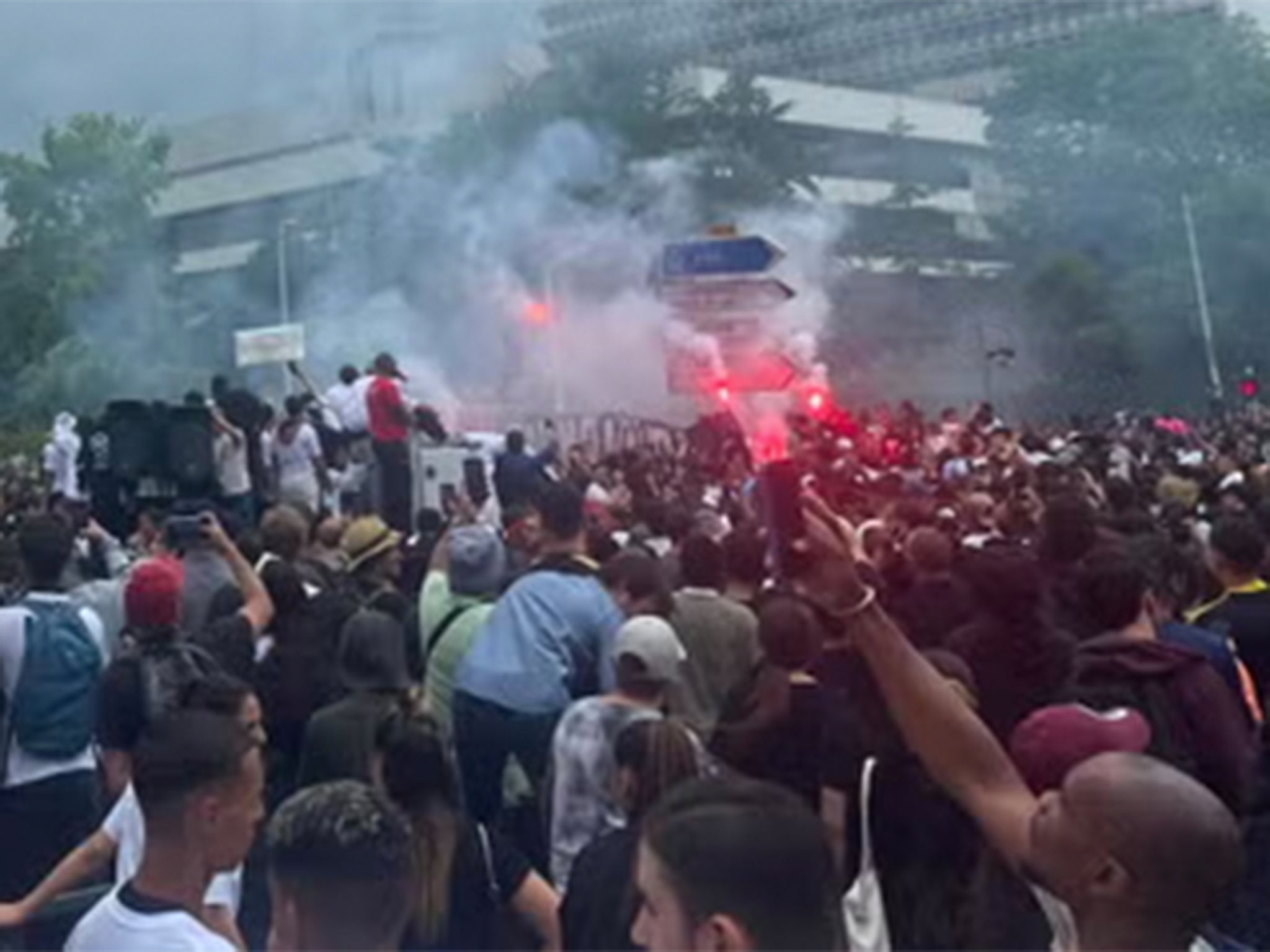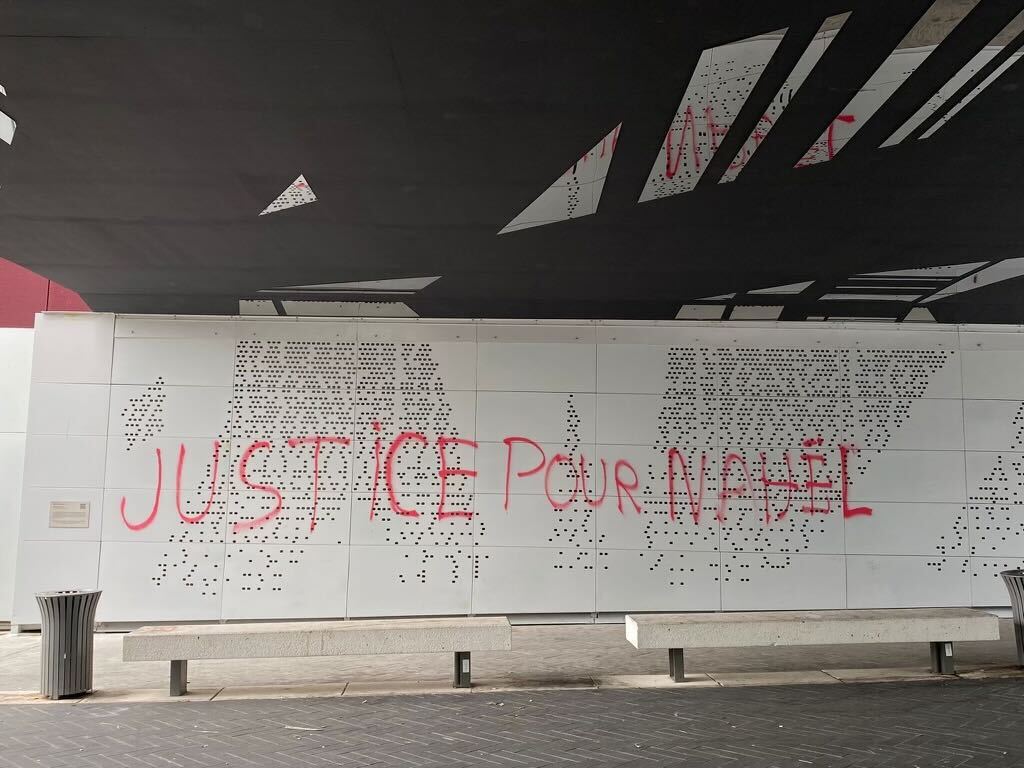Emotional, desperate, full of rage – witnessing the Paris protests with my teenage daughter
Sophia came to the French capital to celebrate her 18th birthday – instead, we were caught up in carnage in the suburbs, writes Amelia Loulli. Neither of us will forget what we saw


This trip to Paris with my teenage daughter, to celebrate her 18th birthday, has been filled with all of the things you might expect. Long walks through the city past endless iconic landmarks, slow brunches filled with deliciously delicate pastries, warm chocolate crepes, baked eggs.
We’ve hung out in literary haunts made famous by the likes of Jean-Paul Sartre and Simone de Beauvoir, we’ve walked through the gardens of Renoir, climbed the incredible metal legs of the Eifel Tower and sailed along the Seine at sunset, taking in views of the Notre Dame Cathedral and the Pont Nerf Bridge.
But all of this regular luxury has been juxtaposed with the news roaring through Paris of the tragic death of Nahel M – the 17-year-old shot dead by police during a traffic stop in Nanterre on Tuesday night.
As we watched the Eiffel Tower light up like a giant sparkler every hour on the hour of our second night in the City of Lights, riots broke out in an area just 20 minutes by train to the west of the centre of the usual, familiar tourist buzz.
I’m a mother of teenagers – I have three. I talked to my daughter about it and she wanted to see what was happening.
So, we find ourselves in Nanterre. The streets are restless. There is a strange, tense mood, like heavy weather that is about to break. The wide open stretch of children’s play parks and benches that are spread like squares on a chess board between the colourful apartment blocks and the Courts of Justice leading from the Place Nelson Mandela, are deserted.
Parents take their children by the hand and walk them home at lunchtime from the school blocks at the end of the road, which is completely cordoned off by an overwhelming presence of police vehicles – 30 to 40 vans – and officers holding riot shields.
There is an undeniable atmosphere of “us vs them” when it comes to protesters and the police – assembled in force, dressed in full protective gear – many of them eating lunch on trays in their police vans. Under a bridge joining university buildings to family apartment blocks and shops, the words “Justice pour Nahel” are written in red paint.

Or, they were. Within an hour the words are scrubbed off. For a while, the only noise is the sharp sound of sirens which fill the place like a dreadful moan.
The French police are here. They are very, very here. And the people know it. A throng of people and reporters begin to gather at the gates of the courts. The crowds are eerily quiet. That is, until the protest, which forms at Avenue Pablo Picasso, begins.
Quickly gathering huge numbers, it is charged with a painful desperation and the powerful, guttural screams from thousands of people, repeating the red words from under the bridge: “Justice Pour Nahel”.
We are caught up in the crowd and so we have no choice but to follow the van carrying Nahel’s family and friends, holding their placards bearing their beloved’s name, clapping and chanting. It’s all so impossibly unlike the centre of Paris just 11km away.
As a mother, here with my daughter Sophia, the same age Nahel was, I find myself wondering if he ever climbed the Eifel Tower, if he liked baked eggs – what he wanted to do with his life.
While we are here, my daughter receives a phone call confirming her place on the college course she hoped to get on for next year. Her life, like all teenagers is, or should be, hers for the taking. And yet here are thousands of people who know this is not always how it plays out.
There are signs listing the many names of others killed in France. The rage of the young people and the communities of people of colour here in Nantelle is painfully palpable.
People scream for justice for Nahel and their feelings about the police are splashed across angry placards. I clutch my daughter’s hand tightly, watching Nahel’s mother atop the roof of the white transit van as she cries for “justice”.
As the protest progresses through the intense Parisian June heat, it blocks every road approaching the courts.
Suddenly, the people, clapping, cheering and chanting feel like no match whatsoever for that line of police vehicles. There are roars all around us as Nahel’s mum, Mounia, stands on the roof of the van outside the courts, holding a flaming flare in her hand.
The police look on in solid block formations from behind the spiked fences; the mood changes to one of extreme tension.
And then the officers fire tear gas into the crowds.
The sky fills with smoke, people start wiping their eyes with their T-shirts and I quickly leave Nanterre with my daughter. I am aware of how fortunate we are. I know other mothers are not. The cries of “Justice Pour Nahel” echo in my ears long after we are gone.
Join our commenting forum
Join thought-provoking conversations, follow other Independent readers and see their replies
Comments



Bookmark popover
Removed from bookmarks